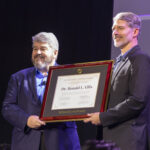
New cancer research by Cardiff University in the United Kingdom was released in January showing promising results in T-cell cancer therapy research.
T-cell therapy removes and modifies existing cells, programming them to seek and destroy cancer cells when reintroduced into a patient’s bloodstream. The new process is currently only approved to treat lymphoma and acute lymphoblastic leukemia.
Professor Jeri Whitfield, assistant professor of nursing at California Baptist University, has a background in oncology. She said she believes T-cell research in the last few years has revolutionized how clinicians view cancer and help fight cancer.
“The chemotherapy cancer therapy that people received was so harsh and the side effects were so great that people were so sick when they got them,” Whitfield said. “Some of the meds they now give to help with the side effects have helped a lot.”
Whitfield said that T-cell therapy gives patients an opportunity to work and still get therapy. Since T-cell therapy goes hand-in-hand with chemo, it is also a way for patients who already tried chemo or who relapse to receive treatment in another way.
“My understanding is that things are still in the clinical trial stages,” Whitfield said. “People right now are being treated with these new drugs that the T-cells have been programmed to target cancer. While they are perhaps not able to give the stats or data about how much success because it’s too new, I’m hearing stories that people are getting good results from it.”
Researchers are calling T-cell therapy a prospective “one size fits all” cancer treatment. The clinical trials will show how the treatment reacts to other forms of blood cancer.
Vina Ocampo, assistant professor of nursing, said it would be a miracle if studies show the treatment to be beneficial in that way.
“T-cells are fighter cells that help with immunity,” Ocampo said. “When there is an infection those are the cells that help fight off the infection.”
Although Whitfield believes the impact it is having in lymphoma patients is enormous, she is skeptical about the belief that T-cell therapy could be a one-size-fits-all cancer treatment.
“Every cancer cell acts differently; it has a mind of its own,” Whitfield said. “Getting someone’s immune system to target cancer — that’s huge.”
Lily Perez, sophomore pre-nursing student, said she is curious to see how treatments will work after clinical trials.
“It is important to remember that not everyone reacts the same way to treatment,” Perez said.
In treatments for lymphoma alone, T-cell therapy has an 80 percent success rate as of January 2020. Although current therapy research can only be used in a handful of cases, T-cell research is opening doors for new research.


